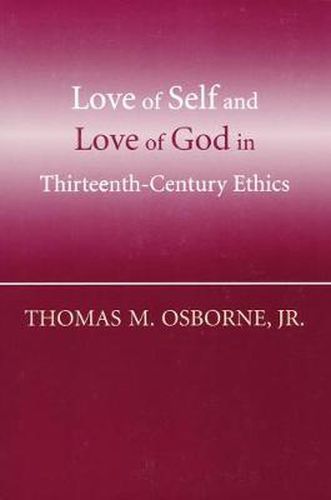Readings Newsletter
Become a Readings Member to make your shopping experience even easier.
Sign in or sign up for free!
You’re not far away from qualifying for FREE standard shipping within Australia
You’ve qualified for FREE standard shipping within Australia
The cart is loading…






In this book, Thomas M. Osborne, Jr., covers an important, but often neglected, aspect of medieval ethics, namely the controversy over whether or not it is possible to love God more than oneself through natural powers alone. In debating this topic, thirteenth-century philosophers and theologians introduced a high level of sophistication to the study of how one’s own good is achieved through virtuous action.
The central issue for medieval scholars was how to adapt Aristotle’s philosophical insights to a Christian framework. For Christians, loving God above all else was their central ethical duty. Most ancient and medieval Christians were also committed to eudaimonism, or the view that one’s good is always maximized through virtuous action. The tension between these two aspects of Christian ethics reached its highest point in philosophical discussions about whether God can be naturally loved more than oneself. Osborne provides a history of these debates, based on a close analysis of primary texts, clarifies the concepts that are most important for understanding eudaimonism, and argues that the central difference between the ethical theories of such great thinkers as Thomas Aquinas and John Duns Scotus is not about morality and self-interest, but rather about the relationship between ethics and natural inclination.
The arguments raised by the thirteenth-century philosophers and texts discussed in this book have important implications for natural law theories and virtue ethics and are essential for understanding the shift to modern moral theories. Love of Self and Love of God in Thirteenth-Century Ethics will be invaluable to philosophers and theologians, particularly those concerned with medieval philosophy, moral psychology, the history of ideas, and ethics.
$9.00 standard shipping within Australia
FREE standard shipping within Australia for orders over $100.00
Express & International shipping calculated at checkout
In this book, Thomas M. Osborne, Jr., covers an important, but often neglected, aspect of medieval ethics, namely the controversy over whether or not it is possible to love God more than oneself through natural powers alone. In debating this topic, thirteenth-century philosophers and theologians introduced a high level of sophistication to the study of how one’s own good is achieved through virtuous action.
The central issue for medieval scholars was how to adapt Aristotle’s philosophical insights to a Christian framework. For Christians, loving God above all else was their central ethical duty. Most ancient and medieval Christians were also committed to eudaimonism, or the view that one’s good is always maximized through virtuous action. The tension between these two aspects of Christian ethics reached its highest point in philosophical discussions about whether God can be naturally loved more than oneself. Osborne provides a history of these debates, based on a close analysis of primary texts, clarifies the concepts that are most important for understanding eudaimonism, and argues that the central difference between the ethical theories of such great thinkers as Thomas Aquinas and John Duns Scotus is not about morality and self-interest, but rather about the relationship between ethics and natural inclination.
The arguments raised by the thirteenth-century philosophers and texts discussed in this book have important implications for natural law theories and virtue ethics and are essential for understanding the shift to modern moral theories. Love of Self and Love of God in Thirteenth-Century Ethics will be invaluable to philosophers and theologians, particularly those concerned with medieval philosophy, moral psychology, the history of ideas, and ethics.